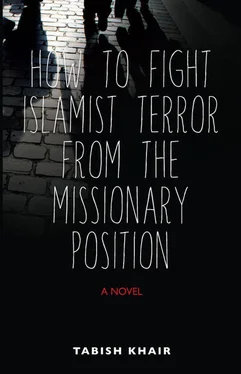But even when it came to his Marxist relationships, Ravi sometimes encountered women who either did not do things “to” him or who withdrew their initiative unexpectedly. At first, I had expected Ravi to take these setbacks in his stride; after all, it was seldom that he was not dating, openly and unabashedly, at least two women. And he did take them well, but not without a lurch. I knew one of his girlfriends had broken up with him unexpectedly, or vice versa, when Ravi would requisition me and march us to the nearest bar; he would proceed to get so drunk that I had to tuck him into his bed that night.
The last week of February was a particularly remarkable one on these counts. On Thursday, Ravi broke it off with one of the three women he was having his cultural revolutions with at the time.
“She is getting too emotional, you know, yaar,” he explained to me. “A bit like one of your purdah-shrouded khatoons probably got with you in Pakistan.”
“You don’t know what you are talking about, Ravi,” I countered.“Have you ever crossed the gates of any of those Muslim girls’ colleges? The kind of comments our gals in purdah aim at a good-looking man would drive any civilized Paleface to turn reddish Indian and scalp himself.”
“Anyway, yaar: not part of the deal. I cannot be responsible for emotions; I love these women, but I don’t think I can love anyone forever.”
This was one of Ravi’s refrains. I had come to suspect, through occasional lapses on his part—for Ravi was unusually secretive about these matters—that this had to do with his parents’ marriage. There was a kind of cynicism in Ravi that either denoted too much knowledge or too much innocence. Only much later did I realize that it could denote both.
Having broken off with Ms. Emotional that Thursday evening—it is not something Ravi did without remorse—he was given his marching slips by the other two girlfriends on Friday.
When I finished teaching around two that afternoon, I had a text message waiting on my mobile. It was from Ravi. “Need to drown hat-trick in hooch,” it said. “Meet at Unibar 1600.”
Unibar is Århus University’s only half-hearted attempt to exorcize the ghost of Denmark’s Calvinist past that occasionally stalks the land even today. University canteens close by four, and the campus area doesn’t have any decent bar or pub, something that Ravi found impossible to reconcile with his idea of campus life.
Even I, growing up in the more austere environment of post-Zia Pakistan, was used to cafés and restaurants that stayed open and crowded with students late into the night: what could be drunk was only tea, coffee or lassi, but it was drunk with gusto and the debates and arguments did not suffer from the lack of openly served alcohol.
Such places do not seem to exist on Danish campuses, though there are occasional Friday night bars organized by students here and there, where loud music and cheap alcohol make conversation impossible. Unibar, tucked into the basement of a building in the campus, is an exception: not only does it stay open well beyond midnight, it even stocks one of the best collections in town of Ravi’s beloved German and Belgian beers and plays (good) music softly enough to permit conversation.
Ravi was already into his second Chimay—2009, he liked to move back from the most recent year—beer when I joined him. He took his break-ups quite seriously, one of the things that was surprising and endearing about him, at least in my eyes. He appeared almost disappointed in himself and the world every time one of his relationships—invariably proclaimed impermanent by him—actually failed. For an evening or two, he did a fairly good imitation of Rajesh Khanna or Dilip Kumar in one of their tearjerkers, sometimes even singing songs of heartbreak in his mellifluous voice, with just enough irony in the rendition to prevent one from taking him too seriously. Then he bounced back and was off dating another “plain” woman.
“Why don’t you date only one at a time?” I asked him that evening. “You would avoid these double and triple whammies in that case.”
By then Ravi was on to Chimay 2007.
“I am being kind to them, O Dense One,” he replied. “If I date only one, she is liable to invest more in the relationship, and anyone who invests in relationships is heading for bankruptcy.”
“But why, Ravi,” I pressed the matter, mostly to humor him.
“Why are all relationships doomed in advance?”
“Look who is talking. Dr. Once-divorced-and-still-bindaas!” Ravi sneered.
Then he sobered up a bit, probably realizing that he had gone too far. My divorce had not been a flippant matter for me or my ex-wife.
“Did I tell you, bastard,” he continued, “about my years in Switzerland?”
“I know you finished your high school in Switzerland. You told me your parents sent you there for three years or so.”
“Did I tell you why?”
“I don’t recall if you did.”
“Oh, you would, if I had told you. It is an unforgettable story, the kind of story that gets made into TV serials five times a day. See, bastard, you obviously did not peruse Indian film magazines in high school. I wonder what you used to jerk off to, probably Billy Shakespeare: cabin’d, cribb’d, confined in Karachi, bound to saucy fears… Now, if you had employed your time fruitfully with Cineblitz, Filmfare and the like, you would have read in their issues of the 1980s and early 1990s about this very handsome celebrity Bombay surgeon who was having a roaring affair with one of his star patients, a famous actress. They carried something about it in almost every issue. It was good for circulation. You might also have read of this celebrity surgeon’s wife, herself a once-celebrated actress and socialite, being seen on the arms of various film stars and cricketers, including the great Imran, in the same period. There were rumors of impending divorce. I was sent to Switzerland when the rumors were at their height. When I returned, hallelujah, the rumors had evaporated.”
He took a deep draft from his glass, draining it. Then he got up to fetch himself Chimay 2006. Before he left the table, he added, as if to himself, “But, strangely, only the rumors had disappeared.”
“Why do you call each other ‘bastards’?” Karim Bhai asked us one day. “It is not a nice word, you know.”
“We went to a missionary school, Karim Bhai,” Ravi responded.
“Not the same one, true. In two different countries, yes. Enemy nations even. But Jesuit schools, so it hardly mattered.”
Karim Bhai, who had been educated in government schools, did not get the joke.
“Immaculate conception, Karim Bhai,” Ravi explained. “There is no greater term of honor than bastard in those circles.”
Karim Bhai still did not understand. But Ravi had moved onto other topics. Which was just as well, I thought; it was obvious that Karim Bhai took Jesus—Isa Masih to him—very seriously as a prophet who was destined to return and restore the world to Islam and righteousness.
It had by now become clear to us that we had underestimated Karim Bhai’s religiosity. His flat was a hub for informal Quranic studies every Friday evening, when young men, mostly bearded, and women, mostly shrouded, would descend on it for long discussions over coffee, tea, nimki and other snacks that Karim diligently stocked. These ended at nine sharp, when Karim went off to ply his taxi, unwilling to let religion deprive him of the lucrative Friday-night custom.
In the first few weeks, we had missed these sessions. We had hit town early on those Friday evenings. But when Ravi discovered the sessions, he started making a conscious effort to attend them. I would either stay in my room or go out with friends. Sometimes he would join us much later in the night.
Читать дальше












